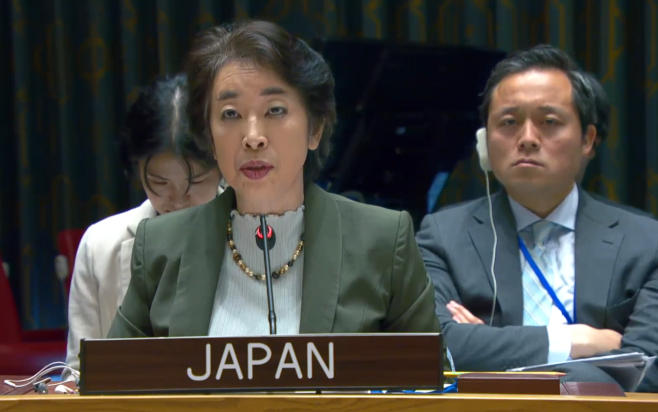リビアに関する国際刑事裁判所(ICC)検察官報告書に関するブリーフィングにおける志野大使ステートメント
令和6年5月14日

(As delivered)
Thank you, Mr. President.
I thank Prosecutor Khan for briefing us on his 6th and 27th in total report on the situation in Libya. I also welcome Ambassador El-Sonni, Permanent Representative of Libya, to today’s meeting.
It has been 13 years since this Council referred this case to the ICC. The Court has engaged in investigations, not only with regards to the 2011 violence, but also on issues with detention facilities, crimes related to the 2014-2020 operations, and crimes against migrants, under the mandate of resolution 1970.
Japan appreciates these investigative efforts by the ICC and supports the Prosecutor’s belief that these efforts should not be viewed as never-ending stories. Realizing the objectives of the mandate set by the Security Council is critically important in the current international political landscape.
In this regard, Japan welcomes the Roadmap towards completion of the investigative phase in relation to the situation in Libya. We take note that the Roadmap includes a significant activity plan for the next 18 months, including the ICC’s intensified support for multiple prosecutions in domestic courts. We would also like to highlight that this Roadmap also covers the Court’s continuing role in the judicial and complementarity phases even after the completion of the investigation at the end of 2025.
At the same time, we would like to recall that the humanitarian and human rights situation in Libya remain distressing amid rising instability in the region. The Security Council press statement issued earlier this month emphasized the importance of providing a safe environment for civil society organizations. In this context, it is important to ensure that the ICC works closely with affected communities and deepens partnerships with States, civil society, and regional and international organizations during the process of completing the investigative phase in order to achieve accountability for the people in Libya. We also stress the critical importance of continued and substantial engagement with these groups including victims during the next phases of the judicial and complementarity processes to realize justice even given the political stalemate.
With regard to procedure, since this is the very first case in which the Security Council will see the completion of an ICC investigative phase under a mandate given by the Council through a resolution, we recognize the need for the Council to consider appropriate action to reflect this transition. This may include consideration of the reporting requirements of the Prosecutor’s Office after 2025.
Before concluding, we would like to welcome the improved cooperation of the Libyan authorities as highlighted in the report, including the issuance of multiple-entry visas and direct engagement with Libyan legal authorities. We also take note that the Roadmap for completion was developed in consultation with the Libyan authorities, and express our hope that cooperation and efforts for complementarity will improve as laid out in the Roadmap.
The successful completion of the investigative phase should serve to improve justice under the rule of law and push forward the fight against impunity. As the Prosecutor concluded his briefings, rule of law must apply in Libya, as well as elsewhere in the world. Japan always stands ready to support the Court to fulfill its critical role.
I thank you.
